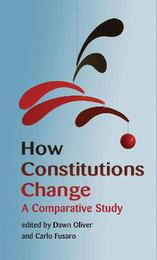
|
How Constitutions Change: A Comparative Study
Paperback / softback
Main Details
| Title |
How Constitutions Change: A Comparative Study
|
| Authors and Contributors |
Edited by Professor Dawn Oliver
|
|
Edited by Carlo Fusaro
|
| Physical Properties |
| Format:Paperback / softback | | Pages:510 | | Dimensions(mm): Height 244,Width 171 |
|
| ISBN/Barcode |
9781849464987
|
| Classifications | Dewey:342 |
|---|
| Audience | | Professional & Vocational | |
|---|
|
Publishing Details |
| Publisher |
Bloomsbury Publishing PLC
|
| Imprint |
Hart Publishing
|
| Publication Date |
3 October 2013 |
| Publication Country |
United Kingdom
|
Description
This set of essays explores how constitutions change and are changed in a number of countries, and how the 'constitution' of the EU changes and is changed. For a range of reasons, including internal and external pressures, the constitutional arrangements in many countries are changing. Constitutional change may be formal, involving amendments to the texts of Constitutions or the passage of legislation of a clearly constitutional kind, or informal and organic, as where court decisions affect the operation of the system of government, or where new administrative and other arrangements (eg agencification) affect or articulate or alter the operation of the constitution of the country, without the need to resort to formal change. The countries in this study include, from the EU, a common law country, a Nordic one, a former communist state, several civil law systems, parliamentary systems and a hybrid one (France). Chapters on non EU countries include two on developing countries (India and South Africa), two on common law countries without entrenched written constitutions (Israel and New Zealand), a presidential system (the USA) and three federal ones (Switzerland, the USA and Canada). In the last two chapters the editors conduct a detailed comparative analysis of the jurisdiction-based chapters and explore the question whether any overarching theory or theories about constitutional change in liberal democracies emerge from the study.
Author Biography
Dawn Oliver is Emeritus Professor of Constitutional Law at University College London. Carlo Fusaro is Professor of Public Comparative Law at the University of Florence, Italy
ReviewsThe volume undoubtedly assembles a considerable amount of useful and interesting material relating to the individual countries studied. In this way, it provides a valuable compendium, making information on a number of less known constitutional systems available in English. ...comparative public lawyers will no doubt value the information on how constitutions change in the various legal systems assembled and represented in the volume. -- Michal Bobek * Cambridge Law Journal 71(3) * Due to the broad approach adopted in this book, a lively picture is drawn of the different constitutional cultures including historic, political, legal or social aspects. How Constitutions Change contains many exciting and surprising details about constitutions all over the world...as the editors suggest, this book has to be seen as first approach to a theory of constitutional change. In this regard, the study offers viable opportunity to get familiar with the many aspects of this topic. -- Sebastian Schmid * International Journal of Constitutonal Law Volume 6, No. 2 * This collection of essays [on How Constitutions Change] provides authoritative academic commentary and reflections on the evolution of contemporary democratic principles. The collection is rich in insights which should encourage researchers to pursue comparative research, and suggests a uniquely effective approach to the task. -- Pier Luigi Petrillo * Percorsi Costituzionali * The Authors note that a constitution totally unsuited for change sooner or later is doomed to become an instrument incapable of serving its purpose, bound therefore to be superseded. In the end, they believe that constitutional patriotism is best served by ensuring that a given set of constitutional arrangements can be adapted and incrementally changed rather than making out of it a petrified object of devotion. And I would agree with them. -- Prof. Stefano Ceccanti, Italian MP * www.federalismi.it Issue 24 *
|